It’s day one of Bryant’s Innovation and Design Experience for All (IDEA) program and first-year student Thomas Morton is busy building a bean bag chair out of balloons. Blowing up the balloons and tying them together with three other group members, the students' next step is to wrap the chair in masking tape.
Throughout the room, 15 other undergraduates from the class of 2027 huddle together and discuss product dimensions, balloon inflation levels, and whether a circular or square base would be sturdier. With only 30 minutes on the clock, the students are also developing a name and sales pitch for their product. This is the first cohort activity of IDEA’s three-day program, yet it’s the ideal task for getting students into the design thinking mode.
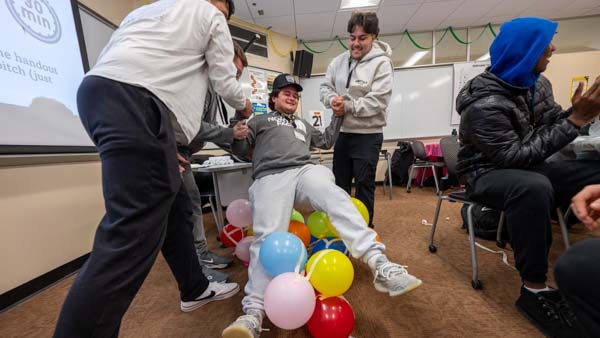
Celebrating its twelfth year, IDEA provides first-year students with a design thinking crash course, where they use creative problem solving to arrive at innovative solutions. Students are guided in real time by student, faculty, and staff mentors, all of whom are volunteers.
RELATED ARTICLE: IDEA student mentors give back while helping first-years embrace innovation
“Through working in teams to solve current, real-world innovation challenges, you will emerge from Bryant IDEA with sharpened skills in problem solving, teamwork, and creativity,” IDEA Program Director and Psychology Professor Allison Butler, Ph.D., told students during the opening ceremony on January 22.
More than 11,000 students have participated in the program since its inception. Under this year’s theme, “Passion Meets Purpose,” students traveled to businesses in Rhode Island, Connecticut, and Massachusetts to better understand the challenges facing each industry. Projects ranged from sustainability in the community to enhancing the patient and family experience at children's hospitals.
“The Bryant IDEA program is a unique experience that we are very proud of. It truly distinguishes our graduates and our university,” said President Ross Gittell, Ph.D. “You will be able to build on your experience over the next three days in future coursework to secure internships, to get jobs, and for your career success.”
Kicking off their field research, cohort 18 visited the Connecticut Sun, an American professional basketball team in the Eastern Conference of the Women’s National Basketball Association. At Mohegan Sun Arena, students discussed sports equality with Connecticut Sun President Jennifer Rizzotti and several development and marketing and communications staffers. Seated in the facility’s conference room, students asked how professional sports organizations can promote and ensure equal representation, pay, and media coverage for women athletes.
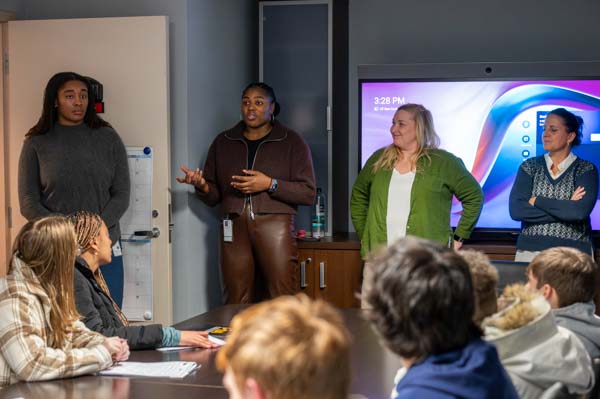
“Since a lot of your spectator demographic includes families, are you working to expand that?” asked Samantha Rosenfield.
Returning to campus, cohort 12, which visited Blue Cross & Blue Shield of Rhode Island’s Your Blue Store in Cranston, was challenged with looking at how young adults can be better advocates for their physical, emotional, and behavioral health. Through empathy interviews with four industry professionals, students learned about the social determinants of health, preventative medicine, and insurance costs associated with medical care. Following the sessions, students spent the evening debriefing and considering themes and trends discovered through conversations.
Day 2: The depths of design thinking
After a good night’s sleep, the students returned to work using the insights they gained from the previous night’s empathy interviews to map out the journeys of people living through their assigned challenges.
Sometimes, that introspection and analysis can clarify things to a crystal-clear point. In cohort 12, charged with examining how young adults might become better self-advocates for their physical, emotional, and behavioral health, Solange Daluz’s group mapped the journey of individuals struggling with the aftermath of sexual and physical abuse. “Every step of the way, the most important thing is that they should know that they’re cared for and that there are people there to support them,” she noted. The group’s work was informed by interviews with Blue Cross & Blue Shield of Rhode Island’s Danielle Leonardo, manager of business planning, and Amy Blustein, director of marketing communications.
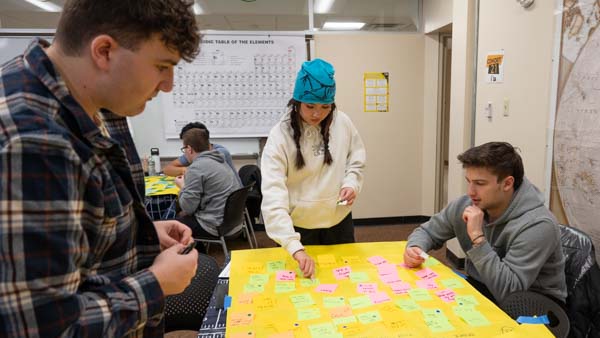
Lunchtime ushered in an exercise in team dynamics that charged every cohort with passing 200 tennis balls among teammates before finally depositing them in a collection bucket. When the two-minute timer began, teams leapt into action, passing and pivoting and laughing.
“This is chaos!” Lecturer of History, Literature, and the Arts Ryan Sonder, who is leading the exercise, announced joyfully. Across five rounds, the cohorts developed new strategies and tried out new ideas, some successful — others less so. But each attempt helped the teams learn to trust one another.
Fresh from the competition grounds, the students took part in a brainstorming exercise, with the prompt of creating a better backpack. In cohort 8, faculty mentor Tim Wolski, an adjunct professor of Marketing, encouraged students to share their wildest ideas — from built-in geolocators to rockets and air fryers.
In the evening, each cohort was joined by alumni mentors who helped them further refine their projects, which they’ll spend the night building into tangible prototypes for judges to assess the next day. In cohort 2, tasked with making the investment process more accessible, Michelle Gallagher ’96, VP, workplace regional manager at Fidelity Investments, and Mimi Mitrelis ’90 M.S.T., professor of accounting at Providence College, listened to the student groups pitch their ideas and discuss their process. The alumni then posed new questions for them to ponder.
“The alumni have so much experience and insight,” said Ekaterina Erickson, whose group proposed a cafe-style space for informal financial advising. “They know so much about the issues we’re working on, and the challenges involved with them, and then turn to you and ask: ‘How can you help solve them?’ ”
It's a challenge the team took to heart. Realizing there’s work to be done before their prototype was perfect, Erickson’s team resolved to keep iterating throughout the night, with snack breaks, a petting zoo, and a late-night dance party to fuel their creativity and innovation.
Day 3: Ideas into action
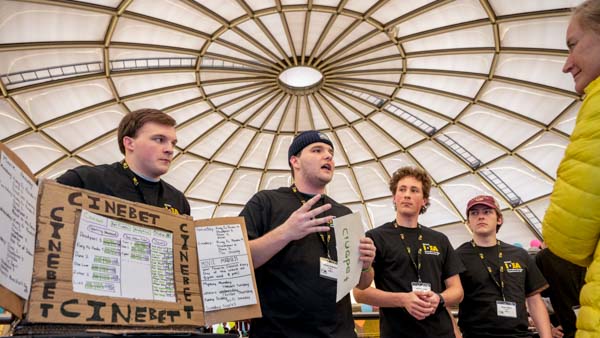
On the third day of IDEA, student cohorts polished their prototypes and packed up for the Innovation Exposition. There, volunteer judges from the Bryant community probed students on their projects and the design thinking methodology that led to their solutions.
In the Unistructure, Maria Sanders, Summer Sakowicz, and Sophia Letitia, from cohort 25, presented “SnapSlope Exchange,” a storefront embedded in mountainside hotels that would feature low-cost gear – some traded in – and family deals on winter sports products. The students, all skiers, said they enjoyed diving deep into an industry they love and helping to solve some of its pain points. They also appreciated connecting with students who share similar interests.
“There’s a ski club on campus, and now we’re all interested in joining,” said Sanders. “These were definitely good connections to make.”
Following the expo, the judges tallied their votes and the top four teams rushed to the MAC gymnasium to prepare for an intense “Shark Tank”-style pitch session in front of 900 of their peers. The contest, the first of its kind in IDEA history, was judged by Trustee Professor of Management Mike Roberto and Professor of Management Lori Coakley, Ph.D. in addition to a popular vote via QR code.
The winning team, charged with improving the supermarket experience for consumers, conceptualized a Tetris-style system that would streamline the grocery bagging process so heavier items would shift to the bottom while lighter ones remained on top. Their pitch, the students told the judges, would lighten the so-called load of grocery store employees while providing visual entertainment for consumers.
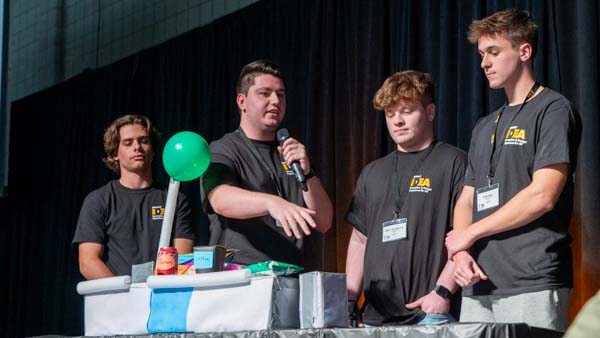
“This program really meant a lot to us,” Aiden Spadorcia, a member of the winning team, said after the closing ceremony, which also celebrated the efforts of IDEA student, faculty, and staff volunteers. “Our spirits were uplifted throughout the process. We wanted to succeed at the start of the day, and we hit it.”
Teammate Luke Stad credits their success to the team’s quick bond – one honed over 50 intensive hours of learning, brainstorming, and designing. All open-minded and light-hearted, Stad and his teammates left as his friends.
“I thought it was going to be this school-sponsored thing we just had to get through, but it was really so much fun,” he said. “I’m very proud of what we accomplished.”